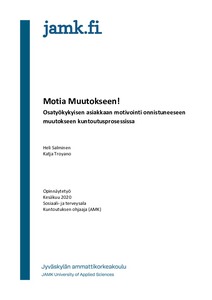Motia Muutokseen! Osatyökykyisen asiakkaan motivointi onnistuneeseen muutokseen kuntoutusprosessissa
Salminen, Heli; Troyano, Katja (2020)
Salminen, Heli
Troyano, Katja
2020
All rights reserved. This publication is copyrighted. You may download, display and print it for Your own personal use. Commercial use is prohibited.
Julkaisun pysyvä osoite on
https://urn.fi/URN:NBN:fi:amk-2020060617500
https://urn.fi/URN:NBN:fi:amk-2020060617500
Tiivistelmä
Motivaatio ja motivoituminen ovat kiinnostaneet tutkijoita jo vuosikymmeniä. Silti ne ovat edelleen aiheena ajankohtaisia sekä mielenkiintoisia. Yksilötasolla hyvä motivoituminen omaan kuntoutusprosessiin edistää toiminnan tehokkuutta ja kehittää pystyvyyden tunnetta. Tärkeää on myös asiakkaan kokema hyöty (arvo) saamastaan palvelusta ja sen tuomista muutoksista. Tutkittavaksi ilmiöksi valikoitui osatyökykyisen motivointi tavoiteltuun muutokseen kuntoutusprosessissa. Kuntoutusprosessin aluksi on hyvä kiinnittää huomio asiakkaan muutosvalmiuteen, sillä muutosvalmius saa aikaan kuntoutumisprosessin etenemisen. Muutos itsessään voi näyttäytyä asiakkaalle niin mahdollisuutena kuin uhkakuvana. Tällaisessa tilanteessa ammattilaisen osaaminen korostuu muutosvalmiuden tukemisessa.
Opinnäytetyön tarkoituksena oli selvittää osatyökykyisen asiakkaan motivoinnin ja motivoitumisen taustoja. Opinnäytetyön tavoitteena oli kuvailla ja ymmärtää osatyökykyisen asiakkaan motivoitumiseen liittyviä tekijöitä kuntoutusprosessissa palveluohjauksen tukena. Opinnäytetyö toteutettiin laadullisena tutkimuksena ja sen menetelmänä oli integroitu kirjallisuuskatsaus.
Tuloksissa korostuu yhteiskunnan vastuu osatyökykyisille suunnattujen palvelujen suunnittelusta ja tuottamisesta sekä työantajapuolen vastuu työtehtävien räätälöinnistä työkykyisyyden mukaan. Myös elämismaailman ja elämäntilanteen huomioiminen on tärkeää. Johtopäätöksinä esitettiin, että motivaatiota heikentävät tekijät painottuivat vahvasti yhteiskunnallisiin, rakenteellisiin epäkohtiin kuten työkyvyn arviointi- ja tukipalveluiden sattumanvaraisuus. Opinnäytetyön tuloksia voidaan hyödyntää esimerkiksi sosiaali- ja terveysalan käytännön asiakastyössä, johtamistasolla sekä koulutuksen näkökulmasta katsottuna asiakkaan yksilöllisyyden huomioonottavien interventioiden kehittämisessä. Abstract
Motivation and becoming motivated have interested researchers for decades, and they are still interesting topics. At the individual level, good motivation for one's own rehabilitation process promotes operational efficiency and develops a sense of capability. It is also important that the clients find the rehabilitation services and the changes they bring beneficial (valuable).
The motivation of a client with a partial work ability for the targeted change in the rehabilitation process was chosen as the phenomenon of study. At the beginning of the rehabilitation process, it is good to pay attention to the client's readiness for change because it helps the progress of the process. Change itself can appear to the client both as an opportunity and a threat. In such a situation, the competence of the professional is emphasized in supporting readiness for change.
The purpose of the thesis was to examine the backgrounds of motivation and becoming motivated with clients with a partial ability to work. The aim was to describe and understand the motivational factors that would support service guidance in a rehabilitation process. The thesis had a qualitative research approach, and its method was an integrated literature review.
The results emphasized society's responsibility in developing and producing services for people with partial work ability. Moreover, the results also highlight employers' responsibility for customizing the work according to ability. It is also important to consider the client’s life situation. The conclusions were that the factors that weakened motivation were strongly focused on social and structural evils, such as poor provision of work ability assessments and other support services. The results of the thesis can be utilized, for example, in practical client work in the social and health care field, at the management level and from the point of view of education in the development of interventions that take the clients' individuality into account.
Opinnäytetyön tarkoituksena oli selvittää osatyökykyisen asiakkaan motivoinnin ja motivoitumisen taustoja. Opinnäytetyön tavoitteena oli kuvailla ja ymmärtää osatyökykyisen asiakkaan motivoitumiseen liittyviä tekijöitä kuntoutusprosessissa palveluohjauksen tukena. Opinnäytetyö toteutettiin laadullisena tutkimuksena ja sen menetelmänä oli integroitu kirjallisuuskatsaus.
Tuloksissa korostuu yhteiskunnan vastuu osatyökykyisille suunnattujen palvelujen suunnittelusta ja tuottamisesta sekä työantajapuolen vastuu työtehtävien räätälöinnistä työkykyisyyden mukaan. Myös elämismaailman ja elämäntilanteen huomioiminen on tärkeää. Johtopäätöksinä esitettiin, että motivaatiota heikentävät tekijät painottuivat vahvasti yhteiskunnallisiin, rakenteellisiin epäkohtiin kuten työkyvyn arviointi- ja tukipalveluiden sattumanvaraisuus. Opinnäytetyön tuloksia voidaan hyödyntää esimerkiksi sosiaali- ja terveysalan käytännön asiakastyössä, johtamistasolla sekä koulutuksen näkökulmasta katsottuna asiakkaan yksilöllisyyden huomioonottavien interventioiden kehittämisessä.
Motivation and becoming motivated have interested researchers for decades, and they are still interesting topics. At the individual level, good motivation for one's own rehabilitation process promotes operational efficiency and develops a sense of capability. It is also important that the clients find the rehabilitation services and the changes they bring beneficial (valuable).
The motivation of a client with a partial work ability for the targeted change in the rehabilitation process was chosen as the phenomenon of study. At the beginning of the rehabilitation process, it is good to pay attention to the client's readiness for change because it helps the progress of the process. Change itself can appear to the client both as an opportunity and a threat. In such a situation, the competence of the professional is emphasized in supporting readiness for change.
The purpose of the thesis was to examine the backgrounds of motivation and becoming motivated with clients with a partial ability to work. The aim was to describe and understand the motivational factors that would support service guidance in a rehabilitation process. The thesis had a qualitative research approach, and its method was an integrated literature review.
The results emphasized society's responsibility in developing and producing services for people with partial work ability. Moreover, the results also highlight employers' responsibility for customizing the work according to ability. It is also important to consider the client’s life situation. The conclusions were that the factors that weakened motivation were strongly focused on social and structural evils, such as poor provision of work ability assessments and other support services. The results of the thesis can be utilized, for example, in practical client work in the social and health care field, at the management level and from the point of view of education in the development of interventions that take the clients' individuality into account.
